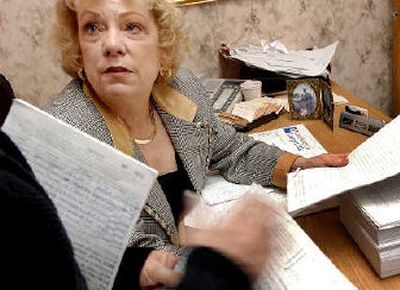Ballot deadline looms

All Chuck Cline can think of is 47,881 – the exact number of valid signatures Idahoans must gather to land a tax-limiting initiative on the statewide ballot.
“I have nightmares at night about that one,” said Cline, a former Nez Perce County commissioner who has been working 18 months on the measure that would cap property tax increases at 1 percent per year. “And the closer it gets the less I sleep.”
People in almost every county, including Kootenai and Bonner counties, are scrambling to get enough signatures from registered voters by the April 30 deadline. Cline guesses that the current total is about 11,000 signatures, only about 23 percent of what’s needed. Yet he remains confident, saying he wouldn’t remain dedicated if it wasn’t an achievable goal.
Coeur d’Alene real estate agent Sharon Culbreth hopes that the nearing adjournment of the Idaho Legislature will give the initiative a much-need boost. That’s because, she said, people will see that state lawmakers haven’t done much this session to fix the root problem – the escalating cost of property taxes.
It’s a difficulty especially prominent in resort towns like Coeur d’Alene and Sandpoint, where property values have increased by as much as 250 percent in a year. Homeowners now shoulder about two-thirds of Idaho’s $1.1 billion property tax bill. That’s up from 40 percent a quarter-century ago, according to a state analysis of 2005 property taxes.
A tax revolt – meaning Idahoans forcing a vote to completely change the state tax code – is seemingly the only way to make any progress on the problem that’s been simmering for years, Culbreth said.
“The Band-Aids aren’t working anymore,” she said. “There needs to be a real overhaul.”
The initiative would cap property taxes at 1 percent of value and redefine value to freeze it, then allow increases of 0.8 percent per year. It would reset the value to the sale price when a property sells. The measure also would make a long list of other changes in property tax laws.
The Idaho attorney general has ruled that some provisions of the measure would violate the state constitution. The opinion is just advisory and the sponsors are free to pursue the initiative, which they have chosen to do.
Culbreth, a Republican, is so adamant about a solution that she is running for the Idaho House so she can work on the issues firsthand as a legislator. Culbreth is challenging Democrat Rep. George Sayler of Coeur d’Alene and Libertarian Ron Perry in the November election, the same election in which she hopes the property tax initiative will appear.
Sayler, who served on an interim property tax commission that toured the state this summer to hear from residents, doesn’t agree with how Culbreth and the other initiative pushers characterize the Legislature’s work. He said there are several proposals working their way through both the House and Senate that do more than bandage and actually could bring about $200 million in property tax relief to Idahoans.
“I understand the feeling of people that there’s a need, but I don’t think the 1 percent is the right solution,” Sayler said Tuesday from Boise. “I think we need to let the Legislature finish up their work.”
The 2006 session may adjourn as early as Friday.
So far the most highlighted property tax change working its way through the Capitol is an increase in the homeowner’s exemption from its current maximum of $50,000 to $75,000. The amount hasn’t been changed since voters first enacted the exemption by initiative in 1982. The homeowner’s exemption boost was requested by hundreds of Idahoans who testified during this summer’s tax hearings.
The bill also includes land value in the amount, rather than just the value of improvements, and indexes the top amount to inflation in the future.
Lawmakers also are working on a proposal that would increase the “circuit breaker” tax break for low-income seniors and the disabled.
Rep. Dolores Crow, R-Nampa, is the chairwoman of the House Revenue and Taxation Committee. She is opposed to the initiative and said it’s better for legislators to find a fix for the tax system. She said it’s just a tricky problem that people have tried to address unsuccessfully for years.
“We are all property-tax payers too,” Crow said. “People forget that, and they just think we are being mean and ornery. We are working at it and have been actually for years, but it’s hard to come to a consensus.”
Cline said this is likely the only shot Idahoans have in generating enough momentum to get a tax-limiting initiative passed. If they fail, he doubts anyone will have the energy to try again in two years.
“The only thing we can do is keep pressing,” he said. “It’s going to be hard – nip and tuck.”